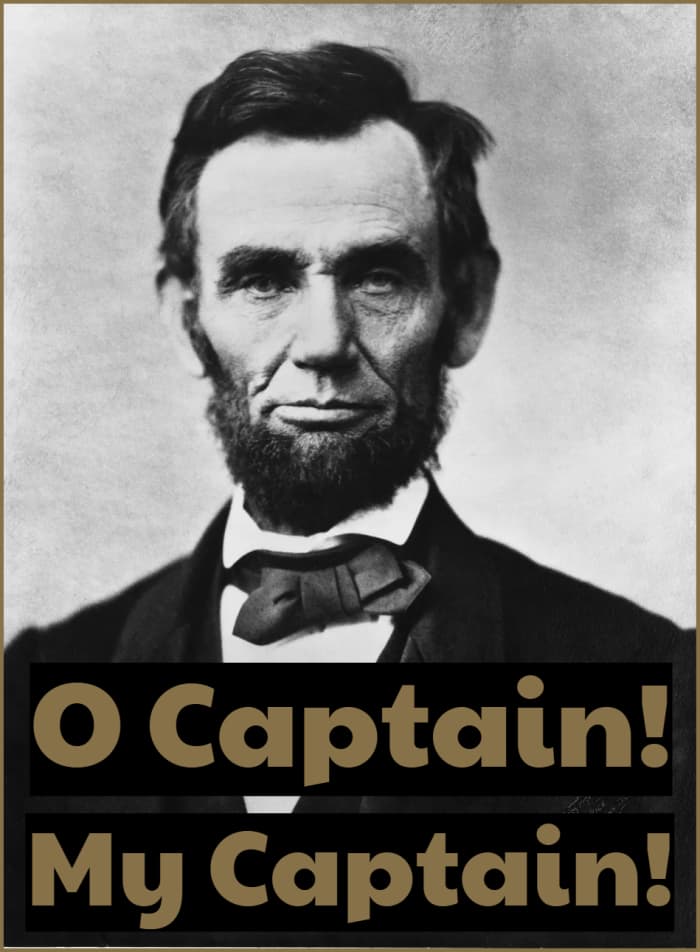in the first line from o captain o captain what does our fearful trip refer to
Howard is an avid reader who likes helping others notice interesting things to read.
The elegy "O Captain! My Helm!" by Walt Whitman was published in November 1865, virtually seven months afterwards the bump-off of Abraham Lincoln. This is significant, equally we'll get into afterwards.
It was an immediate success with the public, and many students had to memorize it. Contributing to this is the poem'south basic structure—couplets with a standard meter and terminate-rhymes.
Whitman didn't think the poem was worthy of all the attention it received. He came shut to regretting that he'd written it.

"O Helm! My Captain!" Line past Line
Nosotros'll work through the poem, taking four lines at a time. We'll consider the literal story that's being told, and too the figurative 1.
The speaker is a crewman on a ship. He tells his Captain that their hard trip is over and its been a success. They're nearing the port, where a crowd waits to celebrate their return.
On a figurative level, the opening lines introduce the metaphorical comparisons in the verse form:
- The Captain is Abraham Lincoln.
- The ship is America.
- The "fearful trip" successfully completed is the Civil State of war.
The speaker as well refers to "my" Helm, indicating a more personal relationship than that between a superior and subordinate.
The speaker reveals their success came at a high cost. The Captain is dead. The speaker is dejected.
The repetition of "center" in the fifth line works to institute the speaker's grief over the Captain's death. Figuratively, it could represent the nation's initial reaction to Lincoln's death.
There's a repetition of "my" Captain, emphasizing the feeling the speaker has for his superior.
Roll to Continue
Read More From Owlcation
The speaker implores his Captain to get upwardly because everything'southward for him. The bells, the music, the flowers, the wreaths and the flag are all for him. The gathered crowd is there to celebrate the Captain, and they can't wait to run across him. The speaker shows deprival by asking someone he knows is expressionless to "rise up". He can't fully accept that it's truthful.
Metaphorically, America historic President Lincoln afterwards the Union's victory in the Civil War. The feeling was brusque-lived, as the celebratory feeling volition be in these lines.
All of the things waiting at the dock work for a celebration and a funeral:
- Bells and bugle trills can be used for a victory or for mourning.
- A flag tin can be flown to requite glory or at half-mast.
- Bouquets, wreaths, and a gathered crowd are mutual to both events.
"My" Helm appears for the third time.
The crewman now refers to his Captain as "dear male parent", showing he viewed him as much more than a commanding officeholder. His deprival continues every bit he says the Captain'south decease must exist a dream.
Every bit a metaphor, Lincoln is being called a "begetter"—he was more than a leader also, equally America looked to him as a father-figure. Many Americans would have found it hard to believe Lincoln was expressionless, thinking it must be a dream.
The speaker isn't talking to his Helm now. He's first to have that he'due south dead. The send reaches port safely. He reaffirms that they've completed their objective.
Likewise, private Americans would somewhen accept that Lincoln was expressionless. The fact remains that the Civil War was successfully fought.
Over again, the speaker says "my" Helm and adds "my" father. There's no dubiety the speaker has lost much more than a commanding officeholder. The Captain has seen him through a hard trip; his judgment has saved the speaker and the rest of the coiffure. He views himself as his Helm's son, as someone who was guided into maturity.
The oversupply will celebrate the ship's triumphant return. The speaker, however, will mournfully walk the deck where his Captain died.
Similarly, the nation in general will rejoice over their victorious armed forces entrada. Some, however, like the speaker, volition be in mourning over Lincoln's death. This tragedy will overshadow the greater victory.
The last use of "my" Captain shows the speaker forgoing the commemoration to continue mourning. He's not set up to live on his own, even though soon, he will have to.
How does the meaning of the refrain change?
The refrain, "fallen cold and expressionless", appears three times in the verse form. Information technology highlights the speaker'south emotional journey as he deals with his Captain's expiry. It also brings the reader along, creating and then releasing the tension over whether this tragedy has actually happened.
The beginning fourth dimension information technology'southward stated is the kickoff time we're told the Captain is expressionless. The speaker, though, doesn't take this reality all the same. In the next line, he asks his Helm to "ascension up."
Similarly, the second time comes correct afterwards the speaker holds out hope that "information technology is some dream."
In the third and last example, the speaker accepts what has happened. He has to deal with his grief before leaving the ship.
Source: https://owlcation.com/humanities/Analysis-Poem-O-Captain-My-Captain-Walt-Whitman
0 Response to "in the first line from o captain o captain what does our fearful trip refer to"
Enregistrer un commentaire